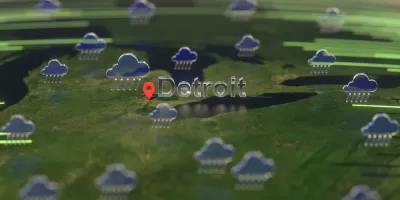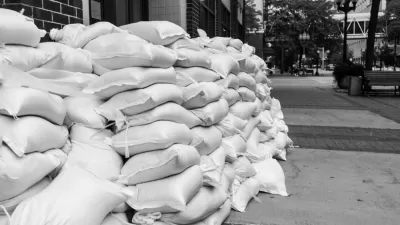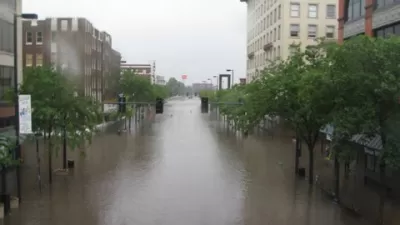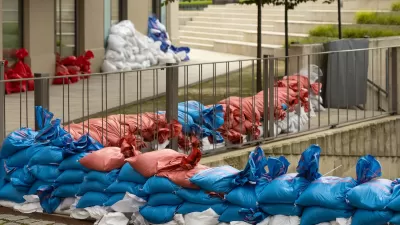While projections say areas of the U.S. Midwest around the Great Lakes will become more hospitable as the climate changes, stormwater and flooding is still a challenge in a surprising number of locations.

Ben Adler writes on the surprising impacts of climate change and extreme weather in the U.S. Midwest—where the summer has been marked by repeated flooding events in cities like Detroit.
The Detroit suburb of Gross Pointe Park is where Adler starts this story, in fact, at the home of Colin Moulder-McComb, which has been flooding regularly enough to drive Moulder-McComb from the area—a perhaps unexpected manifestation of a climate refugee.
For Moulder-McComb, the flooding that once seemed like an anomaly is now a regularity, writes Adler:
While the climate in the Midwest has always been relatively wet, the frequency and severity of downpours has gotten notably worse in recent decades, due to climate change. Warmer temperatures have led to more evaporation and precipitation. Between 1951 and 2017, the Great Lakes region’s average temperature increased 2.3 degrees Fahrenheit, its annual rainfall has risen 17% and it has 35% more heavy rain events, according to a study by Great Lakes Integrated Sciences and Assessments, a collaboration between the University of Michigan and Michigan State University, supported by the National Oceanic and Atmospheric Administration.
And the city of Detroit is suffering terrible effects from the change in the weather: "Between 2012 and 2020, 43 percent of homes in Detroit suffered flooding from rain, according to a recent survey of residents. Conditions like deteriorating roofs and cracks in basement walls made flooding more likely, and African American neighborhoods were more likely to flood than white areas."
Both Adler and Moulder-McComb acknowledge that it's hard to escape the effects of climate change anywhere in the country. But for a region with several advantages in the climate of the world to come—an abundance of fresh water being one of those advantages—it's frightening to see a lack refuge.
FULL STORY: How Midwesterners are handling constant flooding caused by climate change

Alabama: Trump Terminates Settlements for Black Communities Harmed By Raw Sewage
Trump deemed the landmark civil rights agreement “illegal DEI and environmental justice policy.”

Planetizen Federal Action Tracker
A weekly monitor of how Trump’s orders and actions are impacting planners and planning in America.

Why Should We Subsidize Public Transportation?
Many public transit agencies face financial stress due to rising costs, declining fare revenue, and declining subsidies. Transit advocates must provide a strong business case for increasing public transit funding.

Understanding Road Diets
An explainer from Momentum highlights the advantages of reducing vehicle lanes in favor of more bike, transit, and pedestrian infrastructure.

New California Law Regulates Warehouse Pollution
A new law tightens building and emissions regulations for large distribution warehouses to mitigate air pollution and traffic in surrounding communities.

Phoenix Announces Opening Date for Light Rail Extension
The South Central extension will connect South Phoenix to downtown and other major hubs starting on June 7.
Urban Design for Planners 1: Software Tools
This six-course series explores essential urban design concepts using open source software and equips planners with the tools they need to participate fully in the urban design process.
Planning for Universal Design
Learn the tools for implementing Universal Design in planning regulations.
Caltrans
Smith Gee Studio
Institute for Housing and Urban Development Studies (IHS)
City of Grandview
Harvard GSD Executive Education
Toledo-Lucas County Plan Commissions
Salt Lake City
NYU Wagner Graduate School of Public Service





























